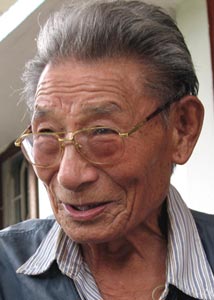Name: Apey
(Alias: No)
Gender: Male
Interview Age: 88
Date of Birth: 1919
Birthplace: Chi Nying Dongpa, Kham, Tibet
Year Left Tibet: 1959
Profession: Dairy Farming, Farming
Monk/Nun: No
Political Prisoner: Yes

Interview No.: 1
Date: 2007-06-27
Language: Tibetan
Location: Lugsung Samdupling Settlement, Bylakuppe, Karnataka, India
Categories: Culture and History
Keywords: army -- Tibetan, Bylakuppe -- early life in , Chinese army -- invasion by , escape experiences, Kham, monastic life, refugee in India -- life as, taxes, trade
Summary:
Apey is the fourth child of seven. He became a monk at Sama Datsang at the age of eight and remained there until the age of 18. He was forced to leave the monastery and return home to support his family, who had become poor due to the unfair actions of Apey's uncle. Apey helped his family pay taxes to the Tibetan government. Later he went to serve Dapon 'Colonel' Mogya, the highest Tibetan military officer.
When the Chinese arrived in Tibet, Apey fought as part of the Tibetan army against the Chinese even though he was not a Tibetan government soldier. After the fall of Chamdo and capture of Dapon Mogya, Apey went to Lhasa and warned people about the invasion of the Chinese, but at that time, they did not believe the Chinese would come to Lhasa.
Apey took up work as a wool trader for an aristocratic family in Lhasa. When Apey learned that His Holiness the Dalai Lama had left Tibet, Apey escaped by crossing over a mountain pass to Sikkim and ultimately he reached Kalimpong. He later joined the Indian army and remained there for seven or eight years.
Interview Team:
- Marcella Adamski (Interviewer)
- Tenzin Yangchen (Interpreter)
- Jeff Lodas (Videographer)

